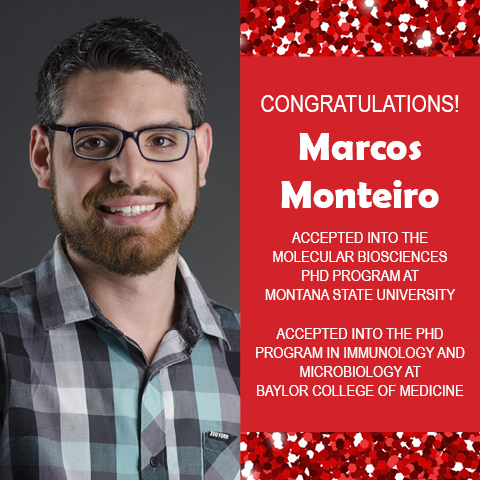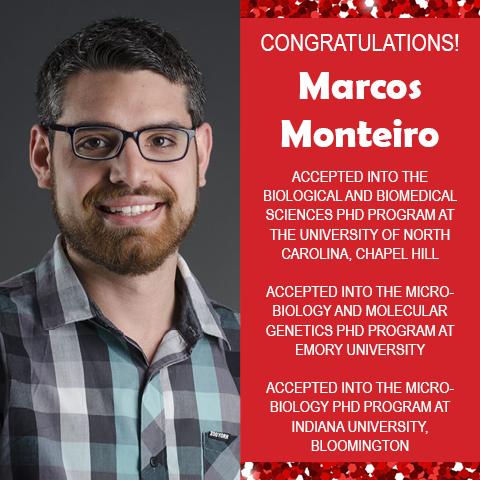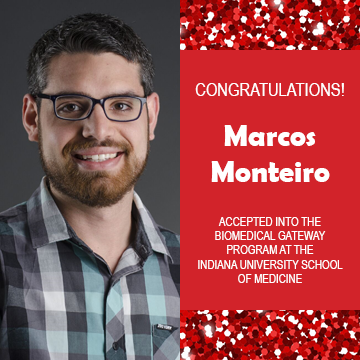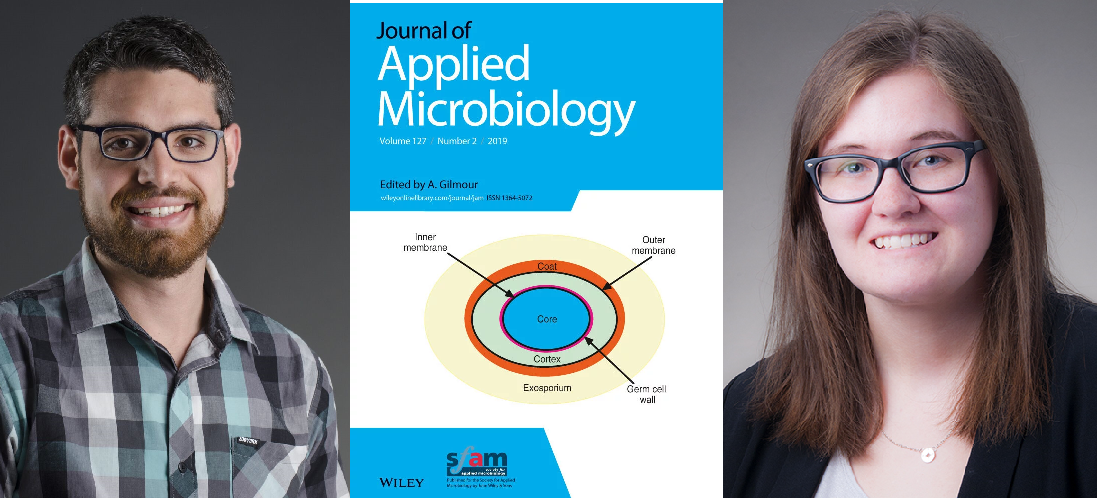Marcos Monteiro
Marcos Monteiro graduated from Eastern Washington University in 2020 with a major in Biology and a minor in Chemistry. He is interested in understanding how microbes cause infectious diseases at the molecular level and in understanding the relationship between the human microbiome and diseases. He received the Barry Goldwater Scholarship and worked on research in the Fred Hutchinson summer research program for undergraduates in the summer of 2019.
Marcos was accepted with full funding into the Biological and Biomedical Sciences PhD Program at the University of North Carolina, Chapel Hill; the Biology PhD Program at Indiana University Bloomington; the Molecular Biosciences (MBS) PhD Program at Montana State University; the IBMG PhD program at IU School of Medicine; theBaylor College of Medicine PhD Program in Immunology & Microbiology; and the Biology and Molecular Genetics PhD Program at Emory University, where he began attending in Fall 2020.
2018-19 McNair Faculty Research Mentor: Dr. Andrea Castillo – Biology
Research Title: Manuka Honey Chelates Iron to Impact Iron Regulation in Pseudomonas Aeruginosa
Abstract: The gram-negative bacterium, Pseudomonas aeruginosa, is a leading cause of infections in burn patients and demonstrates a high level of antibiotic resistance. For this reason, Manuka honey (MH) has been investigated as an alternative antimicrobial and proven effective against 152 different strains of P. aeruginosa. Additionally, exposure to sub-minimum inhibitory concentrations (MICs) of MH has not bred MH resistant bacteria. This is likely due the multiple antimicrobial mechanisms of MH, a major one being methylglyoxyl (MGO) production. Recent studies suggest that iron limitation may be an additional MH antimicrobial mechanism. Herein, we used a colorimetric ferrozine-based assay to demonstrate that MH chelates ferrous iron from solution. To determine if bacteria cultured with MH experienced iron limitation, iron regulated siderophore production was quantitated in P. aeruginosa cultured with sub-MICs of MH; siderophores are small molecules that bind ferric iron with high affinity and are produced by bacteria when iron is limited. MH treated P. aeruginosa produced significantly more siderophores than the untreated controls. Finally, we examined whether supplemental iron could offset the antimicrobial effects—growth inhibition—of MH. Growth of P. aeruginosa supplemented with either ferrous (Fe2+) sulfate or ferric (Fe3+) citrate increased significantly over the non-supplemented controls. Our results support that iron limitation through iron chelation contributes to MH’s antimicrobial activity. Our future experiments will investigate which components of MH act to chelate iron and how iron uptake mutants respond to MH with iron supplementation.
2019 Summer Research Mentor: Dr. Neelendu Dey, MD at Fred Hutch
Research Title: Bioengineering Escherichia coli as a Tool for Understanding Carcinogenic Products of Bile Acid Metabolism by Gut Bacteria
Abstract: Conjugated bile acids (CBA) are synthesized by the liver from cholesterol and released into the small intestine to emusify fats and insoluble vitamins. Bacteroides vulgatus is a gut microbe that efficiently metabolizes CBA into unconjugated bile acids (UBA); its genome encodes three distinct bile salt hydrolase (bsh) genes. UBA can be further modified by gut bacteria to produce deoxycholic acid (DCA), high levels of which are linked to colorectal cancer and colorectal adenomas. It is unclear how multiple encoded bsh genes relate to robust deconjugation by B. vulgatus. We hypothesize that one or more bsh genes encode enzymes that are efficient in deconjugation and that co-expression of multiple bsh genes enables efficient deconjugation by B. vulgatus. Our goal is to functionally characterize each B. vulgatus bsh genes via recombinant expression in Escherichia coli using the pBAD plasmid system. To validate our use of the pBAD plasmid system, we cloned the red fluorescent protein (RFP) gene into pBAD. Our results show that bsh 2, bsh 3, and RFP were cloned into pBAD in the desired region and successfully transformed into E. coli. We verified our results through plasmid extraction followed by PCR targeting the gene of interest, and via capillary sequencing. Future work will involve assessing the deconjugation ability of each bsh gene by culturing these E. coli constructs with conjugated bile acids. This work will further our understanding of B. vulgatus and other bsh-expression microbes contribute to the production of DCA and the development of colorectal cancer.

EWU McNair Scholar Marcos Monteiro Accepted into Two Additional PhD Programs

EWU McNair Scholar Marcos Monteiro Accepted into Multiple PhD Programs

EWU McNair Scholar Marcos Monteiro Accepted into Indiana University School of Medicine

McNair Scholars Publish Article with Mentor in the Journal of Applied Microbiology




